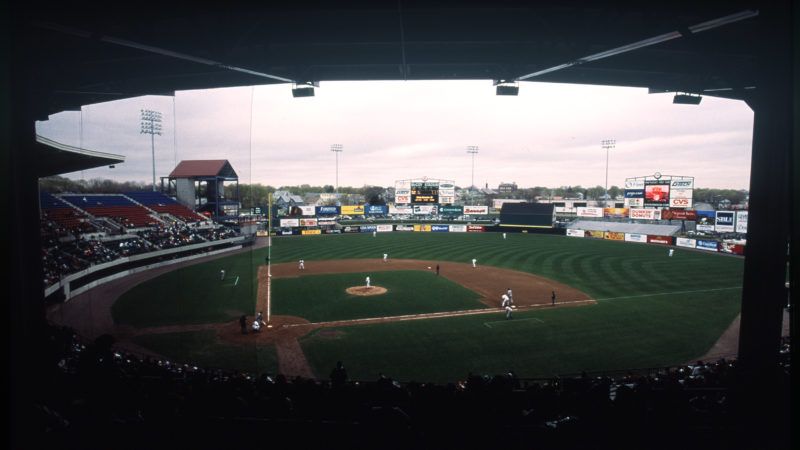Taxpayers Still on the Hook for Stadium Debts, Even Though Coronavirus Canceled Sports
But then, those stadiums weren't likely to bring the growth the cities wanted in the first place.

The Pawtucket Red Sox's final season was supposed to be hitting its midpoint right about now. After 51 years in Rhode Island, the "Paw Sox" are scheduled to decamp to Worcester, Massachusetts, where city officials have used their eminent domain powers—and taxpayers' money—to lure the team to one of the most expensive minor league ballparks ever built.
The coronavirus pandemic has delayed, and maybe fully canceled, the team's season-long goodbye to Pawtucket. In Worcester, meanwhile, the COVID-19 outbreak should cause city officials to worry they might have made a huge mistake.
The Massachusetts city issued more than $100 million in bonds to pay for the construction of the ballpark, two adjacent hotels, an office park, and a collection of apartments, restaurants, and bars. Almost all of that could have been funded by private developers, but the city decided to take the risk itself. Although the Red Sox are supposed to pay off $36 million of the project's cost with future revenue, Worcester taxpayers are on the hook for more than $70 million in general obligation bonds tied to the project.
Ed Augustus, Worcester's city manager, admits to Bloomberg that the city isn't "immune from the reality—from changes in travel and tourism," but he maintains that the city has enough "breathing room" to weather the downturn in demand for both commercial real estate and professional sporting venues. Worcester doesn't owe payments on the debt until 2023, so there's still time for things to work out.
Still, the risk is obvious. As Bloomberg notes, using general obligation bonds to finance a stadium project (and other questionable development) is what landed Harrisburg, Pennsylvania, in dire economic straits after the last recession.
American cities are going to lose about $360 billion in revenue over the next three years, according to a projection from the National League of Cities. The coronavirus pandemic isn't just emptying stadiums and eliminating ticket revenue. It's causing all sorts of economic spending to crater—including the common "tourist taxes" that cities often use to back debt, like those applied to hotel rooms and rental cars.
But these stadium projects were bad deals even before the pandemic-induced economic shutdown.
"The pandemic and the event cancellations it has generated have seriously disrupted the financial calculations that cities made in building stadiums at taxpayers' expense," writes David Boaz, executive vice president of the libertarian Cato Institute. "But they were never a good bargain."
The projections used to justify Worcester's investment in the stadium were iffy even under the best of circumstances. When the Worcester Business Journal surveyed 10 experts about the viability of the city's plan, nine of them expressed skepticism that the ballpark would pay for itself. The only dissenter was a Smith College economist hired by the city to make the case for the project. Study after study after study has debunked the idea that publicly funded stadiums are financially beneficial to anyone other than the team owners, who get free infrastructure for their business.
Worcester isn't the first place to learn this lesson, and it won't be the last. Sixty miles south, Hartford, Connecticut, is losing $3 million annually on publicly funded minor league ballpark that has been a years-long catastrophe for the city. Stadium debt had already wrecked the finances of Glendale, Arizona, long before the coronavirus hit, but now the city may have to yank $1 million out of a rainy day fund to avoid defaulting on those obligations. That's $1 million in taxpayer money that could have been used to deliver vital services, or returned to residents struggling to make ends meet right now.
Cities that bet on minor league baseball could be in for another surprise. Major League Baseball is reportedly aiming to reduce the number of minor league teams that are directly affiliated with major league franchises. Although the Pawtucket-but-soon-to-be-Worcester Red Sox were not included on a leaked list of teams to be cut, the COVID-19 pandemic has strained major league teams' budgets; unloading more minor league affiliates (which generally siphon funding from their big league brethren) remains a possibility. Will the people of Worcester end up paying for a stadium that doesn't have a team?
If Worcester officials are worried about missing out on a tax revenue windfall from the stadium project, the good news is that there was never going to be a windfall in the first place, quips Neil deMause, a critic of publicly funded stadiums who runs the Field of Schemes blog and wrote a book of the same name.
"The bad news," he adds, is that "that's not very good, as news goes."

Show Comments (32)